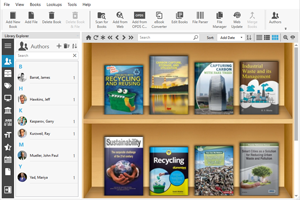3 books on Recycling Plants [PDF]
October 27, 2024 | 21 |
These books are covering the operations of recycling plants, technologies used in material processing, environmental impacts of recycling facilities, challenges in sorting and contamination, innovations in waste management practices, regulatory frameworks for recycling operations and the economic benefits of establishing recycling factories.
1. Reuse It: The History of Modern Recycling
2017 by Ann Byers

Recycling, a practice not deeply rooted in human history, emerges as a relatively contemporary phenomenon. "Reuse It: The History of Modern Recycling" delves into the historical trajectory of recycling, elucidating the technological hurdles it confronts, the economic advantages and disadvantages it presents, and the transformative impact it exerts on markets and the global landscape.
Download PDF
2. Recycling Reconsidered: The Present Failure and Future Promise of Environmental Action in the United States
2013 by Samantha Macbride

The widespread adoption and popularity of recycling have often diverted attention away from the substantial environmental toll of manufacturing the products we consume and eventually discard. While recycling is lauded as an environmental triumph, with evident success in municipal practices, a thriving private recycling sector, and strong public support and participation, its core objectives of saving the planet, conserving resources, and fostering a green economy remain unfulfilled. Samantha MacBride underscores in this book that, despite the fact that more Americans recycle than vote, the majority of solid waste is still either incinerated or buried. MacBride contends that since the inception of the recycling movement in 1970, manufacturers of disposable products have effectively thwarted the implementation of more demanding yet significantly more effective sustainable waste policies. Present-day recycling often creates an illusion of progress while enabling industries to perpetuate the status quo and shift responsibility onto consumers and local governments. MacBride presents a series of recycling case studies that provoke essential questions about whether our current waste management approaches are genuinely the most effective means to attain real sustainability and environmental justice. Her aim is not to discredit or dissuade recycling but to prompt us to contemplate a future beyond the current recycling paradigm.
Download PDF
3. Journey to the Paper Recycling Plant
2012 by Amanda Kaplan

"Journey to the Paper Recycling Plant" takes young readers on an engaging and educational adventure, unraveling the process paper undergoes once it enters the recycling bin. Through lively rhymes, children gain insight into how paper is transformed into fresh, usable paper. The book also provides a handy glossary to explain key or tricky terms, along with enjoyable and imaginative paper-based projects designed to inspire children to become environmental stewards.
Download PDF
How to download PDF:
1. Install Google Books Downloader
2. Enter Book ID to the search box and press Enter
3. Click "Download Book" icon and select PDF*
* - note that for yellow books only preview pages are downloaded
1. Reuse It: The History of Modern Recycling
2017 by Ann Byers

Recycling, a practice not deeply rooted in human history, emerges as a relatively contemporary phenomenon. "Reuse It: The History of Modern Recycling" delves into the historical trajectory of recycling, elucidating the technological hurdles it confronts, the economic advantages and disadvantages it presents, and the transformative impact it exerts on markets and the global landscape.
Download PDF
2. Recycling Reconsidered: The Present Failure and Future Promise of Environmental Action in the United States
2013 by Samantha Macbride

The widespread adoption and popularity of recycling have often diverted attention away from the substantial environmental toll of manufacturing the products we consume and eventually discard. While recycling is lauded as an environmental triumph, with evident success in municipal practices, a thriving private recycling sector, and strong public support and participation, its core objectives of saving the planet, conserving resources, and fostering a green economy remain unfulfilled. Samantha MacBride underscores in this book that, despite the fact that more Americans recycle than vote, the majority of solid waste is still either incinerated or buried. MacBride contends that since the inception of the recycling movement in 1970, manufacturers of disposable products have effectively thwarted the implementation of more demanding yet significantly more effective sustainable waste policies. Present-day recycling often creates an illusion of progress while enabling industries to perpetuate the status quo and shift responsibility onto consumers and local governments. MacBride presents a series of recycling case studies that provoke essential questions about whether our current waste management approaches are genuinely the most effective means to attain real sustainability and environmental justice. Her aim is not to discredit or dissuade recycling but to prompt us to contemplate a future beyond the current recycling paradigm.
Download PDF
3. Journey to the Paper Recycling Plant
2012 by Amanda Kaplan

"Journey to the Paper Recycling Plant" takes young readers on an engaging and educational adventure, unraveling the process paper undergoes once it enters the recycling bin. Through lively rhymes, children gain insight into how paper is transformed into fresh, usable paper. The book also provides a handy glossary to explain key or tricky terms, along with enjoyable and imaginative paper-based projects designed to inspire children to become environmental stewards.
Download PDF
How to download PDF:
1. Install Google Books Downloader
2. Enter Book ID to the search box and press Enter
3. Click "Download Book" icon and select PDF*
* - note that for yellow books only preview pages are downloaded


